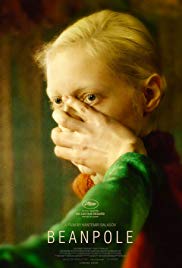Three films about women.
‘Bean Pole’
‘A Fantastic Woman’
‘Dogs don’t wear Pants’
If I were to sit down and pick three movies about women, I couldn’t have done a better job than randomly choosing ‘Bean Pole’, ‘A Fantastic Woman’ and ‘Dogs don’t Wear Pants’. I watched these movies for different reasons and only in retrospect did I realize the thread of strong female roles in them. These are three very different movies from different parts of the world (Russia, Chile, and Finland) that show women as well-fleshed out pivotal characters. This is a refreshing change from the usual role women play in commercial cinema, especially in India. Even the “different” roles in female-centric films tend to show masculine tropes like aggressive revenge flicks or overt sexuality in the name of liberation which in reality is tuned to the male gaze. Watching these three movies in a week, I could appreciate the range of emotions and possibilities of female stories in modern cinema.
The first movie I saw was the 2019 Russian ‘Beanpole’ (dir: Kantemir Balagov). The movie follows two female nurses’ lives in a sanatorium after the Russian victory in WW2. There is no triumphalistic portrayal of victory in a major war; this film focuses on the emotional scars of war even for the victors. The film underscores the adage – there is no winnable war. Victors and losers, all have to suffer. Admittedly, this is not a new topic; many cinematic tropes of alcoholic, violent, PTSD-laden, suicidal men have been portrayed before. What’s new is that Beanpole brings to the surface the hidden cost borne by women in wars.
[spoilers alert]
The movie revolves around Ilya, a tall nurse (hence the name beanpole) at a hospital for injured soldiers and her complicated relationship with her friend Masha, with whom she had served together on the war front. Ilya is responsible for Masha’s kid’s death, an accident she is asked to compensate for by having a child of her own by Masha. The two ladies go on a tragicomic quest to get Beanpole pregnant, to have a baby, something of their own to love in the desolate environment blighted by the weariness of constant survival pressures. In the process, Masha meets a wealthy young man and tries to make a better life for herself.
[spoiler] The whole movie comes to a head in one devastating conversation between Masha and her rich boyfriend’s mother, who unravels the facade and lies women had to create for themselves to endure a war. This crushing unraveling of Masha is a moment of realization for us, who had been seduced by the playfulness of these two women, and reminds us, that war, even for the victorious, is an unbearable wound.
The second movie is the Chilean movie, ‘A Fantastic Woman’, directed by Sebastian Lelio about the travails of a transgender woman who faces insidious prejudice in the hands of family and authorities in the society when she has to navigate a personal tragedy. Marina’s (Daniela Vega) older boyfriend dies suddenly, and she is forced to encounter the medical, legal, and family prejudices against a transwoman, who all treat her with different levels of cruelness. Her dead boyfriend’s family are suspicious of her; they taunting her and threatening her. Each family member exhibits a different shade of cruelty; the son threatened sexual violence, the wife dismissing and insulting, the brother benevolent, yet not willing to give her what she needs; to mourn her dead boyfriend properly.

The film is carried by the brilliance of the actor Daniela Vega who floats through each scene designed to vilify and demean her with angelic grace and dignity. Even in the most excruciating moments, when she is subjected to a nude inspection by a policewoman and doctor, she manages to project a sense of control, with traces of shame. The film is a window to the absolute loneliness of a transwoman’s life, and Vega portrays it brilliantly.
[spoiler] In the end, her one act of impropriety is the most righteous and cathartic, her act of rebellion against the stereotypes forced on her to get back her boyfriend’s dog, whom she loves. Perhaps the only thing that she can trust and be comforted by during her time of loss. Such a beautifully acted poem of love, loss, and human indifference.
The last movie is the most unconventional; ‘Dogs don’t wear pants’ is a Finnish movie directed by J.-P. Valkeapä. It is a story of a successful surgeon Juha who loses his wife to a swimming accident and goes through the rest of his life detached and joyless. He lives with his teenage daughter, who tries to cheer him up and set him up with her teacher, but to no avail. Until he accidentally wanders into a BDSM dungeon when he takes his daughter to a tattoo parlor. His chance encounter with the dominatrix turns into an obsession and a catharsis from his sorrow and guilt.

He pursues and pushes the dominatrix further and further and reaches an unwatchable climax. This movie has some shocking scenes, and through it, it also shows the process of renewal after a tragic loss can take strange forms, and for Juha, pain offers a glimpse of a path to rejuvenation. The dominatrix, whose day job is a physiotherapist seems to have an unexplained soft corner for Juha and their sessions are like therapy for a not-at-all faint of heart, where Juha faces his loss through enduring beatings and choking at the hand of the dominatrix. Of the three movies, this felt the most male, of course, it had a male protagonist and the power dynamics are tilted towards the male protagonist. But surely, the main power belongs to the one with the whip!
